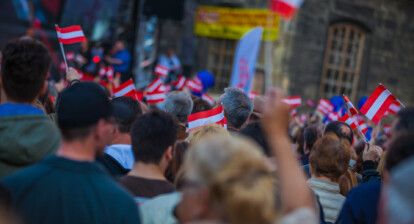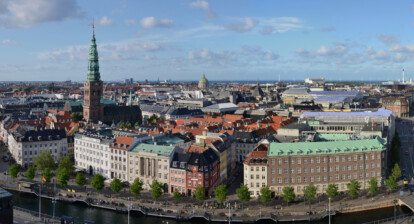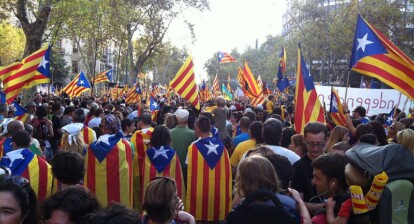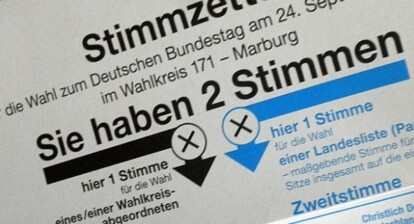2016 saw the rise of populist leaders in Europe and beyond. Can this year be worse? The elections in the Netherlands might be a first thumbnail on Europe’s future. Two Dutch women share their political perspectives with us.
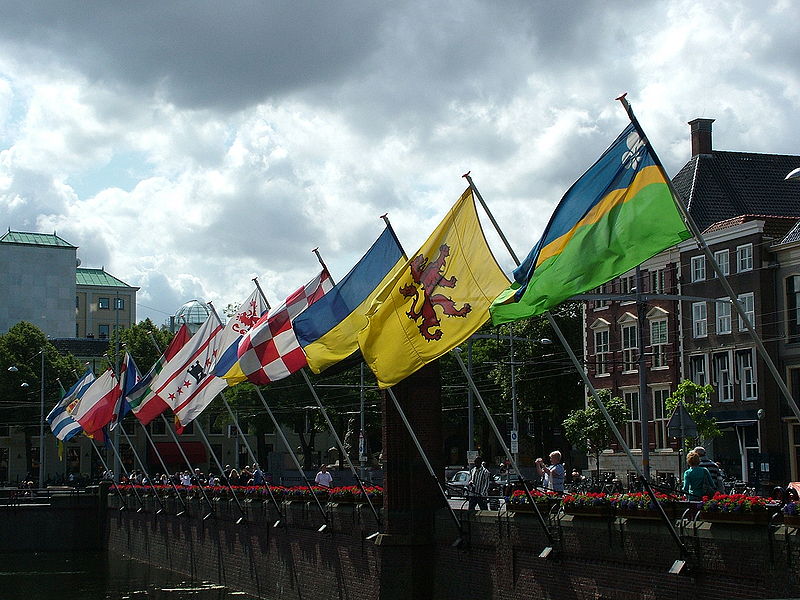
The flags of the Netherland’s Provinces under a dark sky?! (Photo: Ziko // CC)
The Netherlands are going to vote Wednesday, 15th March. Economic growth, rising living standards and shrinking numbers of unemployment – according to these socio-economic indicators one could valuate the coalition of Premier Mark Ruttes right-wing liberal VDD and the social-democrat party PvdA as successful. But the polls and the media discussions see the right-wing populist Geert Wilders and his PVV on the rise. With anti-immigration and anti-EU campaigning he is dominating complete parts of the discourse.
What does the Netherlands youth think on the upcoming elections? Are the Netherlands at a crossroads? If yes, where to proceed?
Two young women, both being active in Dutch politics, share their perspectives with us. There is Carola, a 25-year-old supporting the relatively new funded Forum voor Democratie, a right wing party fighting not only for direct democracy and limits for migration. Our second interviewee is 24-year-old Dyonne currently doing her Master at Leiden University. As member of the social-liberal and progressive Democraten 66 (D66) she is favoring an open, even federalist European Union.
Geert Wilders and his Partij voor de Vrijheid
Geert Wilders and his Partij voor de Vrijheid (PVV) are dominating foreign media reporting on the upcoming elections. Is this also the case in Dutch media?
Carola: Geert Wilders’ popularity is the elephant in the room the media do not like to talk about.
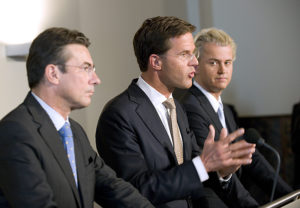
Old and still recent protagonists Maxime Verhagen (CDA), Mark Rutte (VVD) and Geert Wilders (PVV) (Photo: Rijksvoorlichtingsdienst // CC)
In comparison with other established parties, not much attention is given to the PVV. Surely, this is also related to the fact that Wilders refuses to take part in most TV-debates. Yet, in general, the media’s image building of the PVV is negative. There seems to be a huge gap between the perspective of the political media landscape and the off-screen points of view of the ‘common people’.
Dyonne: No. Of course he is present in news coverage on the elections. However, other politicians are far more visible than him. Mainly, this is because Wilders has refused to participate in, or cancelled, most television debates. To me, it just makes no sense a national politician can get away with that. He is currently leading one of the largest political movements in the Netherlands, but refuses to enter discussions with other politicians.
A Closer Look at Political Visibility and Strategy
From a strategic point of view however, I understand his decision. The lack of media coverage on the PVV is often presented by Wilders and his supporters as evidence for an anti-Wilders propaganda agenda of the traditional media. […] This puts him in a unique position since the only way he communicates with his electorate is through social media, most importantly Twitter.
Also, his official campaign program is only one A4 page long (compared to for example the D66 program with over 260 pages). This has allowed him to create his own narrative, which has led to a situation whereby a lot of people have projected their own hopes and beliefs on Wilders and his PVV. The moment he enters a debate and is forced to be more explicit about his political priorities and how he hopes to realise them, he will lose people who have projected their own beliefs on him.
|
Political System of the Netherlands The main political decisions in the Netherlands are taken by the Dutch Parliament, called STATES GENERAL. From two chambers the Lower House (Tweede Kamer) is more influential and decisive concerning national policies. The 150 seats are distributed in a proportional way to the parties participating in the elections. As there is no extra threshold, usually a huge number of parties get elected to parliament – in the last elections 2012 eleven parties were able to send at least two delegates. The political landscape is according to this fact quite subdivided as many parties come up as split ups of former parties. This complicates also the coalition negotiations – a problem expected to be even more difficult after the 2017 elections. An actual issue for many political discussions are the numbers of migrants. Their percentage is with 11.8 of the population (from which we have still 3.1 percent EU-born migrants) not exceptional and has only slightly raised in consequences of the ‘refugee-crisis’ 2015/16 |
Understanding the Roots of Wilders’ Success
Do you also see Wilders’ success as most important question in this election or would you like to have more reports on other topics?
Carola: Much more attention should be given to what has caused the emergence of Geert Wilders’ success. It did not come out of the blue. I believe a great percentage of the Dutch population feels disappointed, frustrated and disillusioned with politics. At present, this chronic disappointment is finally finding some outlet. Wilders is regarded as a politically-incorrect but authentic politician. Politicians of established parties often appear to be true to their word before the elections, but soon enough they break their promises when they are put to the test.
The last couple of years have showed this again and again. Wilders’ success is, therefore, possibly the most important question in this election. Many PVV-voters keep their affinity for the PVV to themselves for fear they might lose their jobs. These are distressing trends, which are not discussed in the media. People should be able to publicly discuss their concerns about the future of our society, without worrying about putting their career at risk. Otherwise, it puts a lot of pressure on our open society and our rights such as freedom of speech.
Dutch identity
Dyonne: I believe Wilders has been one of the driving forces behind the main questions of this election. The main questions this election are concerning Dutch identity and the related question what kind of nation we want to be and how we want to be perceived internationally. What does it mean to be a Dutch citizen? Can anyone become a Dutch citizen? Are we a nation known for tolerance and inclusiveness or do we have to protect ourselves by closing our borders and tightening our immigration laws? Are we working together with the European Union or are we fighting to retrieve some of our sovereignty? However, Wilders is not solely influencing the answers to these questions.
Influence of Figures like Wilders and Trump
And, even though most of what his party says or does is making me extremely angry and sad, I have to admit I sometimes thank people like Wilders and Trump for also bringing out the absolute best in people. Over the past months, their anti-EU, anti-Islam and anti-immigration agenda has inspired a counter-movement of thousands of people all over the world to become way more vocal in their political preferences. […]. For me personally, Trump’s victory was a tipping point as well. I woke up, completely flabbergasted, and I felt the urgency to do something. I was not sure what, or how, or when, but I knew that this was the right moment to ‘come out of the closet’ as a D66’er and try to prevent a similar situation from happening in the Netherlands as had already happened in the US and UK.
Mobilising for Change and Positive Responses
And the most wonderful thing, is that this was not just me, but a sentiment felt throughout the country. In my opinion, plenty of Dutch citizens who are not agreeing with Wilders have always underestimated the power he could potentially obtain in Dutch parliament. Hardly anybody can actually envision Wilders becoming prime minister of the Netherlands. However, Trump’s victory proved all these people wrong and underscored the urgency to voice a different opinion. In addition, all media coverage on the immigration crisis and hard words used by Wilders (he referred to male immigrants as ‘testosterone bombs’) has led to hundreds of Dutch citizens to volunteer at refugee centres. So, a lot of good things are happening as well.
Dynamics of the Electoral Campaign
How would you describe the way the electoral campaign is held? Does it change/influence Netherlands’ society?
Carola: The political establishment including the mainstream media fails to sufficiently address the concerns of the people. Is the European open-border policy compatible with the preservation of our nation state? How much has (mass-) immigration cost us? To which extent is the absence of integration leading to parallel societies? Is the structure of European Union democratic? Is the euro functioning properly? What does it mean to remain in a Eurozone with southern countries such as Greece and Italy, and how much will it cost us?
To fail to address these and other concerns means to lose the trust of the people. This is exactly what has happened in the last couple of years: the trust of the Dutch people in politics and in the media has declined. Yet, when controversial opinions are muted in public spheres, they go underground. People go online and inform themselves to find answers. Internet forums, Twitter and Facebook groups become means to discuss politics with like-minded peoples. That is why non-establishment parties willing to bring up people’s “politically-incorrect” concerns are gaining in popularity.
Shifting Political Dynamics
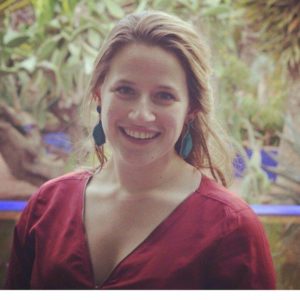
Dyonne is fighting with her party D66 for an open and federal Europe.
Dyonne: A few months ago, many people thought this election would become a Wilders vs Rutte (our current prime minister) battle. However, this has not (yet) happened and I think this is due to other political parties who are having a quite sophisticated and respectful campaign, with a focus on what unites us instead of what divides us. Everyone knows the next coalition will have to try extremely hard to compromise. […] In order to prevent accusations of deliberately making promises they never intend to keep once they have power, their focus lies more on general themes (climate, inclusion, education, economy) which they use to distinguish themselves.
An Election With a Lasting Impact
However, I think this election may have a lasting impact on Dutch society. Even if the PVV becomes the largest political party in the Netherlands, it is highly unlikely that Wilders will become prime minister or even become part of the next government. Firstly, since almost every other political party has said they will not form a coalition with him, and secondly, since it may not be in the interest of a man who is so vocally ‘anti-elite’ and ‘anti-establishment’ to become a visible part of that very same establishment. But, if he will get 25 seats in parliament, that means more than 1,6 million Dutch voters will feel extremely betrayed if he does not become the next prime minister or even part of the coalition. So, I think even more people will lose faith in their politicians than is already the case.
The Most Important Issue of the Campaign
Which issue of the actual campaign you personally consider most important?
Carola: Personally, I believe immigration, the EU and the political establishment are the most important issues of this campaign. The immigration and integration preoccupations have played a big role since Pim Fortuyn, who was murdered by a leftist activist before he took parliament. Nonetheless, the politicians of established parties have shirked to address these concerns appropriately.
Dyonne: What I highly appreciate is that the campaign is focusing on what these political parties can reasonably achieve in different formation. I am inspired by the messages of inclusion which I hear from not only my own political party but also from others. But to be more specific, I attribute high importance to education. In my opinion, the right education can make a world of difference. Not only for children or young students, but I feel it is important to be able to receive additional education your whole life.
The Disappearance of Dutch Cultural Norms and Values
Actual surveys show that besides immigration, health care and social protection systems are especially important for the Dutch voters. What are – according to you – the most urgent questions in this field?
Carola: More than half of the Dutch population thinks the Netherlands is going in the wrong direction. The major concerns are immigration and integration. The Dutch people worry about losing their national identity in a multicultural society. As such, they worry about the disappearance of Dutch cultural norms and values, such as freedom of expression. Moreover, the mass immigration of mostly fortune hunters puts a great strain on society, social security and safety on the streets. This is why mass immigration should be restrictive and repatriation stimulated through resettlement aid for the country of origin.
Healthcare Accessibility and Efficiency
With regard to health care, the deductible excess should be lowered in order to make treatments affordable for everyone. Moreover, there is too much bureaucracy in health care. Doctors waste a lot of time with bureaucratic procedures, which could be used more efficiently for actual treatments. Furthermore, the profits of health insurers should be bound to stricter rules. Health insurance profits should primarily benefit the insured. Finally, it is crucial to invest in a good safety net, but the benefits and social services should not be exploited at the expense of working capital. More control is needed: a social safety net is intended for those who are unable to work; not for those who do not want to work. Taxes and contributions need to be lowered, and more jobs have to be created.
Healthcare Reform and Social Safety Nets
Dyonne: One of the main issues considering health care is the own contribution people must do in order to get treatments. Everyone in The Netherlands has health insurance, and a visit to the general practitioner is free of costs, but if you need further treatments you have to pay an own contribution of roughly €380,-. For many people, this proves to be a barrier to get additional treatments. Some political parties want to completely abolish the mandatory contribution.
However, I believe this will massively increase costs of health care. I think the better solution is to let everyone who is in a position to pay, should, and everyone who is not, should apply for special circumstances and only has to pay partially or in terms. With regard to social protection systems, I think this issue is mostly related to immigration concerns. Every Dutch citizen can apply to these social benefits and it is understandable some people are afraid migrant only come here to take advantages of this system.
In or out of the EU
Which European questions are discussed in this election and what do you think about it?
Carola: The main question is whether the Netherlands should stay in the European Union. In crucial matters, it seems as though our established political elites side with the EU rather than with the Dutch people. The ignored no-votes in the referenda of 2005 (61,6%) and 2016 (61,1%), the parliamentarian vote on European supervision (the so-called IORP II-directive) in less than 24 hours have amplified this mistrust. The mass immigration of mostly fortune hunters and Merkels’ “Wir schaffen das” policy added fuel to the fumes. Can the Netherlands keep its national sovereignty and identity in an ever closer European Union? I wish it were true.
Dyonne: The main European question related to immigration and border control. And, as always, the perception that ‘Brussels’ is making plenty of decisions which are not in the best interest of the Netherlands. However, the EU was one of the spear points of the last elections, but this time not so much. There is much more attention for health care.

